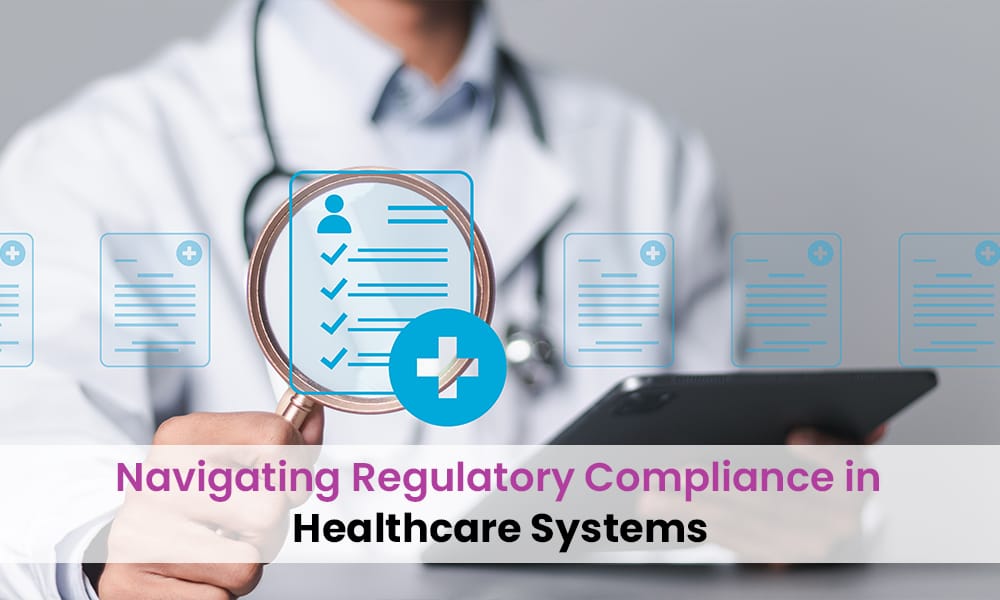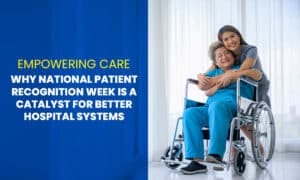
Can your healthcare system survive a compliance audit in 2025? With the rapid expansion of digital health technologies, stricter data privacy laws, and increasingly complex audits, navigating regulatory compliance in healthcare is no longer optional—it’s essential. Every hospital, clinic, telehealth provider, and private medical practice must understand and implement healthcare compliance procedures to avoid fines, protect patient trust, and stay ahead of competitors.
In 2025, regulatory compliance in healthcare matters more than ever. Health systems now handle massive volumes of patient data daily. With the rise of AI diagnostics, wearable tech, and digital consultations, data travels faster and further making it highly vulnerable. Additionally, regulatory bodies have sharpened their focus on enforcement, leading to record penalties for non-compliance. That’s why adopting the best practices for healthcare regulatory compliance can safeguard operations and improve patient satisfaction.
Understanding Healthcare Regulatory Compliance
Healthcare compliance refers to the process by which health organisations follow local, national, and global regulations designed to protect patient data, ensure ethical medical practices, and secure financial integrity. Compliance programs must address both clinical and non-clinical areas—ranging from billing accuracy to patient privacy and safety.
Without strict healthcare compliance, institutions risk violating patient rights, breaching data privacy, and facing legal and financial penalties. Effective compliance also promotes operational efficiency and builds public trust in the healthcare system.
• Key Regulations: HIPAA, HITECH, GDPR
In the U.S., HIPAA regulations (Health Insurance Portability and Accountability Act) stand as the foundation of medical data privacy laws. HIPAA mandates strict controls on how healthcare providers collect, store, and share patient information. Reuters reports that in response to a significant increase in ransomware attacks, the U.S. Department of Health and Human Services (HHS) has proposed new regulations to enhance cybersecurity protections for electronic protected health information (ePHI) under HIPAA.
The HITECH Act (Health Information Technology for Economic and Clinical Health) strengthens HIPAA by encouraging the adoption of electronic health records (EHRs) and penalising data breaches more heavily.
For global healthcare organisations, GDPR (General Data Protection Regulation) applies to any entity that handles the data of EU citizens. It demands even stricter consent, access, and transparency protocols.
Besides the above ones, there are other global regulations that hospitals and healthcare centers must follow –
- HITRUST – Health Information Trust Alliance
- SOX Compliance – Sarbanes-Oxley Act of 2002
• Compliance in Hospitals, Clinics, Telehealth, and Private Practices
Regulatory compliance in healthcare doesn’t look the same across the board. Large hospitals face complex, multi-departmental compliance challenges, while smaller clinics often struggle with resources. Telehealth services must focus on digital encryption and remote security protocols. Private practices, though smaller, carry the same obligations—making a compliance checklist for healthcare organisations critical to stay aligned with laws and prevent oversights.
Common Challenges in Compliance Management

Despite its importance, healthcare compliance comes with its fair share of challenges:
• Data Breaches and Cyber Threats
Healthcare data is a prime target for cybercriminals. From ransomware to phishing attacks, the threats are real and relentless. Without updated encryption and secure access policies, even a single breach can cost millions.
• Keeping Up with Changing Laws
Regulations evolve frequently. Many providers fail to adjust their compliance strategies in time, resulting in violations. Staying informed and updating protocols constantly becomes essential.
• Lack of Internal Training and Audit Preparation
Compliance isn’t just a policy—it’s a culture. Many organisations do not train their staff regularly or adequately, leading to unintentional errors during patient interactions or data entry.
• Manual vs. Automated Processes
Relying on manual documentation and spreadsheets increases the risk of errors and omissions. Automated systems provide accuracy, visibility, and real-time tracking—making them vital for sustainable healthcare compliance.
Best Practices for Healthcare Regulatory Compliance
Implementing the best practices for healthcare regulatory compliance ensures that systems are not only protected but also optimised for long-term growth and safety.
• Conducting Regular Risk Assessments
Risk assessments help identify weak areas in security and operations. Performing them quarterly or annually ensures that you stay ahead of potential threats and adjust your compliance plans as needed.
• Creating a Compliance Checklist
A compliance checklist for healthcare organisations standardises the process. It ensures every department follows the same steps and documents its actions consistently. It also simplifies audits and makes staff responsibilities clearer.
Importance of a Compliance Checklist in Healthcare Organizations
| S.No. | Key Finding | Impact on Standardization |
| 1 | 23% of patients found critical errors in their medical records | Enforces accurate data entry protocols across all departments, reducing patient risk |
| 2 | 20% of patients reported mistakes in EHRs; 40% perceived as serious | Minimises documentation errors through checklist-guided electronic record practices |
| 3 | Inconsistent processes led to severe failures in patient safety and care | Checklists create clear, repeatable workflows that enhance patient safety and care delivery |
| 4 | User errors in digital health tools caused by lack of training | Standardised digital use protocols in checklists ensure consistent tech adoption |
| 5 | 60% of data breaches resulted from privacy regulation non-compliance | Strengthens privacy safeguards and enforces routine checks to prevent breaches |
The table outlines the critical importance of a compliance checklist in healthcare organisations by highlighting key findings and their direct impact on standardising hospital and clinical operations. For instance, with 23% of patients reporting medical record errors and 60% of data breaches linked to non-compliance, the need for structured, repeatable procedures becomes clear.
A compliance checklist helps eliminate such inconsistencies by guiding staff through standardised workflows for patient data handling, electronic health record (EHR) management, and privacy protection. It also plays a pivotal role in reducing human errors that often stem from insufficient training or unclear digital tool usage.
By enforcing uniform protocols and risk assessments, checklists ensure healthcare staff follow best practices consistently, whether in documentation, data security, or patient care. This structured approach not only supports regulatory compliance but also boosts patient safety, operational efficiency, and trust, especially as healthcare systems embrace digital transformation in 2025 and beyond.
• Staff Training and Awareness
Educate all employees—from front-desk staff to surgeons—on HIPAA regulations, data protocols, and emergency breach response. Include real-life examples and role-playing exercises to reinforce learning.
• Internal Audits and Documentation
Audits serve as self-checks. Schedule regular internal audits and record all compliance-related activities. Doing so prepares your organisation for external audits and reduces risk exposure.
Role of Technology in Streamlining Compliance
Technology now plays a transformative role in regulatory compliance in healthcare. Embracing the right tools simplifies tasks, minimises human error, and accelerates response times.
• Compliance Management Systems and AI Tools
Modern compliance platforms integrate AI and machine learning to detect anomalies, track violations, and generate real-time reports. These systems adapt to changing regulations and offer proactive recommendations to stay compliant. Deloitte highlights that in 2025, the regulatory landscape is undergoing significant transformation due to the integration of artificial intelligence (AI) and digital technologies in healthcare.
• Real-Time Alerts and Dashboards
With dashboards displaying compliance metrics, administrators can monitor operations across locations. Alerts notify staff immediately if violations or suspicious behaviour occurs.
• Data Encryption and Role-Based Access Control
Encrypting data both at rest and in transit is mandatory. Combine this with role-based access control to ensure only authorised personnel view or edit sensitive patient information.
• Cloud Compliance
Cloud-based systems offer scalability, faster updates, and better disaster recovery protocols. However, ensure your cloud provider complies with HIPAA regulations and maintains end-to-end encryption.
HIPAA and Patient Data Protection
HIPAA regulations include the privacy rule, which governs how data is disclosed, and the Security Rule, which focuses on electronic data protection. Providers must create strict policies for access control, password protection, and data sharing.
• Protecting Patient Data in EHRs and Digital Health Apps
All digital tools must adhere to HIPAA and encrypt personal health data. Developers and providers must work together to ensure EHRs and health apps are secure and updated regularly.
• Secure Communication in Telemedicine
Telehealth platforms must offer encrypted video conferencing and secure messaging. Avoid consumer-grade tools and invest in HIPAA-compliant platforms that support audit trails and patient consent tracking.
Conclusion
Healthcare systems must take proactive steps to meet and exceed regulatory compliance in healthcare. In an age where patient data flows through multiple digital channels, compliance becomes a strategic advantage—not just a requirement.
By implementing the best practices for healthcare regulatory compliance, using a structured compliance checklist for healthcare organisations, and embracing AI-driven compliance management tools, providers can mitigate risks, build trust, and ensure long-term operational integrity.
Now is the time for hospitals, clinics, and private practices to invest in automation, regular training, and a culture of compliance. Let’s future-proof healthcare—securely and smartly.





